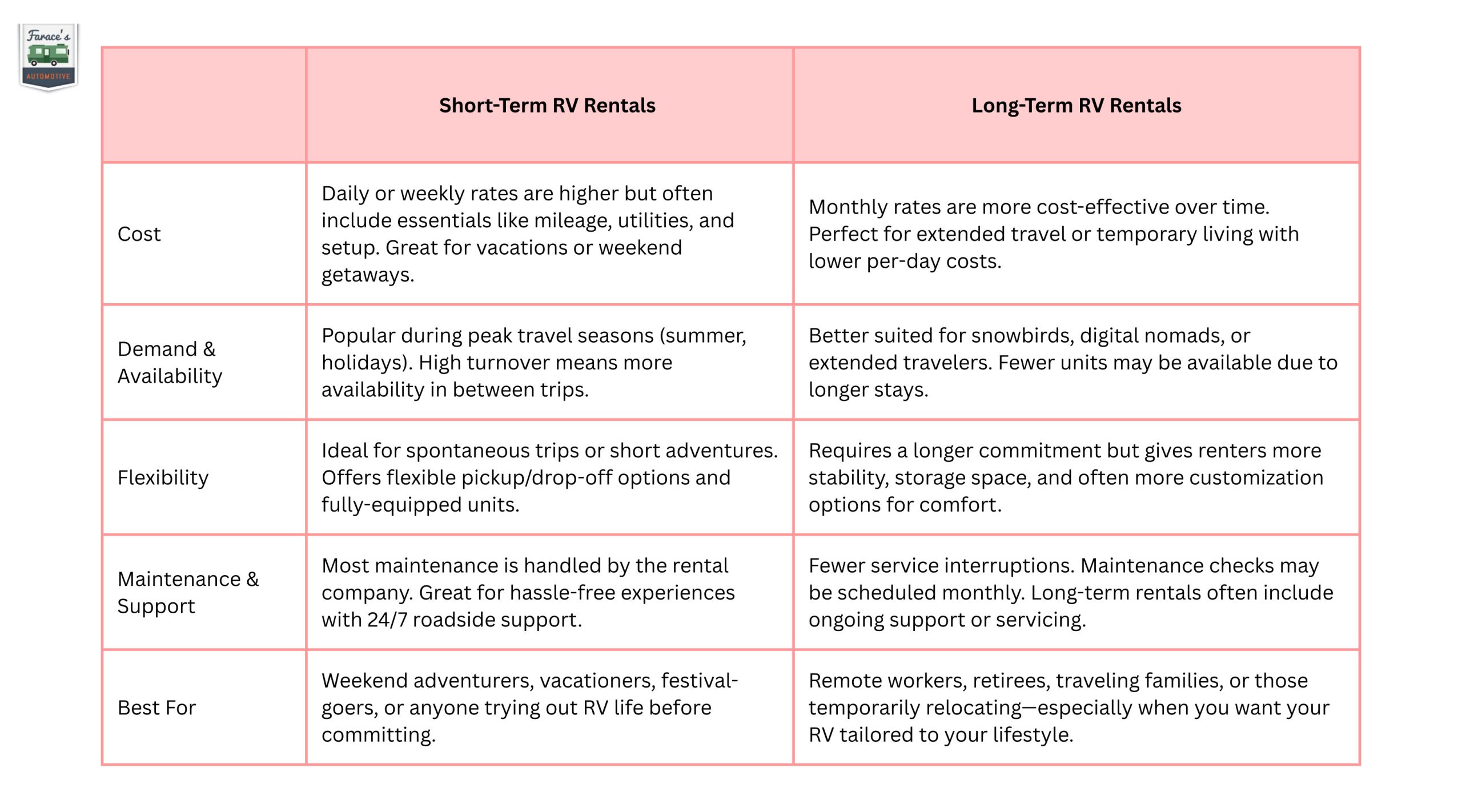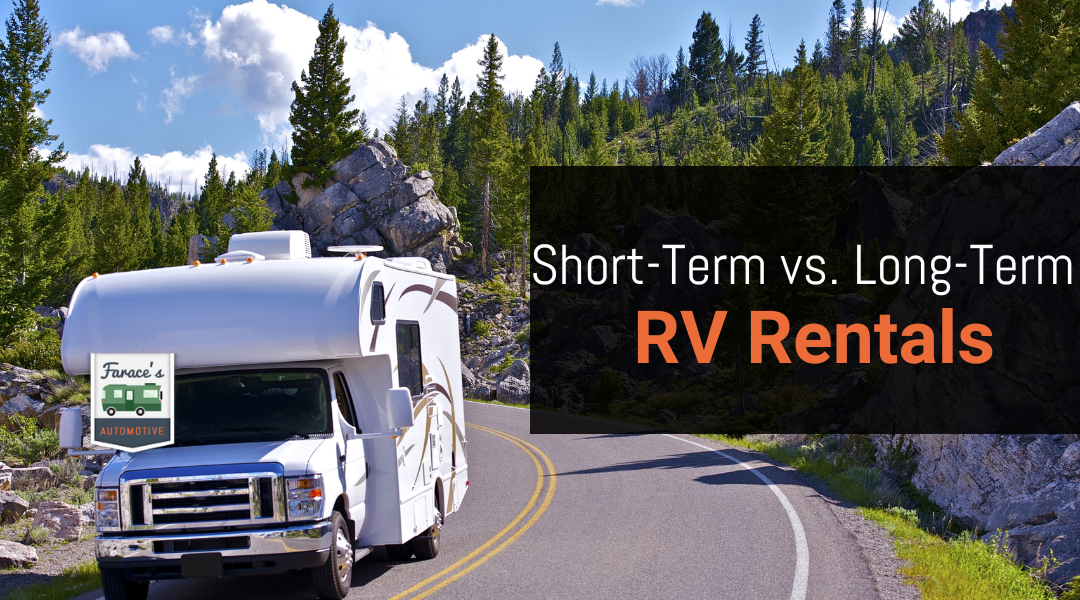Deciding between short-term and long-term RV rentals can shape your travel experiences significantly. Short-term rentals are ideal for occasional adventures, while long-term rentals offer more flexible and cost-effective options for extended trips. As you plan your journey, consider how often you use an RV and the nature of your travels.
If you’re a weekend wanderer, a short-term rental might be perfect. You can explore local parks or take road trips without the commitment of ownership. On the other hand, a long-term rental suits those who crave the freedom to travel at their own pace over several weeks or months. This choice often leads to better financial savings if you plan to spend considerable time on the road.
At Farace Automotive & R.V. Center in Huntington Beach, California, our team understands the intricacies of RV travel. We are here to support your rental decision with top-notch repair and maintenance services, ensuring your vehicle stays in peak condition, regardless of how long your adventure lasts.
Understanding The Differences Between Short-Term And Long-Term Rentals
When considering RV rentals, it’s important to know how short-term and long-term options differ. Each type has unique features that impact cost, maintenance, and your overall experience.
What Counts As A Short-Term RV Rental?
A short-term RV rental typically lasts from a few days up to a few weeks. These rentals are perfect for vacations, weekend getaways, or special events.
You can find many platforms, like peer-to-peer rental services, offering various models for short-term stays.
Key features include:
- Flexibility: You can choose your rental dates with ease.
- Higher rates: Owners often charge more per day compared to long-term rates.
- Turnover: Frequent rentals mean owners must clean and maintain the RV often.
This can result in a higher profit for owners but might also come with more logistical challenges.
What Is Considered A Long-Term RV Rental?
Long-term RV rentals typically extend from one month up to six months or longer. This option appeals to travelers looking for seasonal stays, such as snowbirds or those relocating temporarily.
Long-term rentals offer a more stable arrangement. Renting an RV for months allows you to save on daily rates.
Consider these points:
- Lower costs: Monthly rates are generally discounted compared to short-term daily pricing.
- Fewer turnovers: Owners spend less time preparing the RV for new travelers.
- Maintenance: With longer rentals, you may need to handle basic upkeep and repairs.
This can help you form a more personal connection with the RV and the camper community.
How Duration Affects Cost, Maintenance, And Planning
Duration plays a significant role in cost, maintenance, and planning for both renters and owners.
Costs:
- Short-term rentals have a higher daily rate, making them ideal for brief trips.
- Long-term rentals usually come with a reduced monthly fee, benefiting those who need prolonged stays.
Maintenance:
- Owners of short-term rentals need to be more hands-on, ensuring the RV is clean and functional between renters.
- In long-term rentals, maintenance may shift to you, the renter, providing you the chance to learn about RV upkeep.
Planning:
Short-term rentals require quick decision-making and flexibility. You may need to book well in advance, especially during peak seasons.
In contrast, long-term rentals enable easier planning for extended travel. This allows for a more laid-back experience, giving you the freedom to explore at your own pace.
Benefits Of Short-Term RV Rentals
Short-term RV rentals offer a unique blend of freedom and convenience. They are designed for those who want flexibility without a long-term commitment. Below are some key benefits to consider.
Ideal For Weekend Getaways And Tryouts
Short-term RV rentals work well for quick trips or weekend getaways. If you want to escape the routine for a couple of days, renting an RV can be the perfect solution.
You can explore new destinations at your own pace. Whether it’s a beach trip or a mountain retreat, an RV gives you a cozy home on wheels.
Moreover, it’s a great way to try out different RV models before making a purchase. This “test drive” allows you to understand what features are most important to you.
Lower Commitment, More Flexibility
With short-term rentals, you avoid long contracts and hefty commitments. You can rent an RV just for a few days or weeks. This suits travelers who may have unpredictable schedules or don’t need an RV year-round.
You also have the freedom to choose from various types of RVs according to your needs. Want a compact camper for two? Or maybe a larger vehicle for a family trip? Your options are plentiful.
This flexibility lets you plan trips spontaneously. No need to worry about maintenance or storage when the trip is over.
Easier Scheduling And Availability
Finding an RV for a short duration is often simpler than for long-term rentals. Many rental companies have a range of options readily available.
You can easily book your rental for popular times like summer vacations or holiday weekends. This accessibility allows you to secure your RV quickly without extensive planning.
Additionally, short-term rentals often come with various pick-up and drop-off options. This convenience helps reduce travel time and stress.
Whether you’re a first-time renter or an experienced traveler, short-term RV rentals offer simplicity and adventure at your fingertips.
Advantages Of Long-Term RV Rentals
Long-term RV rentals offer unique benefits that make them an appealing choice for travelers. You can enjoy flexibility and comfort while exploring new places or working remotely.
Perfect For Extended Road Trips Or Remote Work
If you’re planning a lengthy road trip, a long-term RV rental is ideal. It allows you to stay in various locations without constantly packing and unpacking. You can drive to different sites and take your home with you.
For those who work remotely, an RV provides an excellent workspace. Many modern RVs come equipped with Wi-Fi capabilities, allowing you to stay connected. This setup lets you balance work and leisure seamlessly while traveling.
Cost Efficiency Over Time
Long-term rentals can save you money compared to booking multiple short-term rentals. Generally, you’ll find that rates decrease the longer you rent. This approach is especially beneficial if you plan to stay somewhere for weeks or months.
Additional savings come from avoiding hotel fees and dining out for every meal. You can cook your own meals in the RV, helping you stick to a budget. Consider this aspect when planning your trip; it could lead to significant cost savings.
More Customization And Home-Like Comfort
With a long-term RV rental, you can personalize your space. Many RVs allow you to bring your belongings, enhancing comfort during your stay. You can stock up on your favorite snacks, clothes, and other essentials for a more enjoyable experience.
Also, many long-term rentals come with better amenities. You can choose models that offer better kitchens, bathrooms, and living spaces. This allows you to create a home-like atmosphere while traveling.
When To Choose Short-Term Vs. Long-Term
Deciding between short-term and long-term RV rentals depends on several key factors. Your travel goals, frequency of use, and budget will greatly influence which option is best for you.
Travel Goals And Destination Considerations
Think about where you want to go and what experiences you seek. If you are planning a short getaway to a popular destination, a short-term rental may suit you well. These rentals often provide flexibility, allowing you to explore different areas without committing long-term.
For extended trips, like cross-country travel or seasonal living, long-term rentals are ideal. They offer a stable base and might provide better rates when renting for weeks or months.
Consider how much you want to explore different locations. Short-term rentals are perfect for quick trips, while long-term options support in-depth exploration.
Frequency Of Use And Seasonal Travel
How often you plan to use the RV is crucial. If you enjoy frequent weekend trips or plan to travel during certain seasons, short-term rentals can be more appropriate. They allow you to enjoy the RV lifestyle without a year-round commitment.
Long-term rentals shine for those who want to travel for a few months, especially during peak seasons. They often come with cost savings compared to multiple short-term bookings.
Assess your travel habits. A few weekend trips mean short-term is convenient. More extended adventuring calls for long-term planning and commitment.
Budget And Time Constraints
Budget plays a significant role in your decision. Short-term rentals can have higher daily rates but may not strain your finances for brief escapes.
Long-term rentals typically offer lower monthly rates, making them cost-effective if you plan to use the RV for an extended time. Factor in maintenance costs as well; long-term rentals might bring more predictable expenses.
Your time constraints should also be noted. If you have limited time to travel, a short-term rental can be easier to manage. Conversely, if you have more time, consider the comfort of a long-term rental to maximize your experience.
Cost Comparison: Breaking Down The Numbers

When considering short-term versus long-term RV rentals, it’s vital to look closely at the costs involved. Understanding your expenses can help you decide which option is best for your needs.
Price Per Day Vs. Price Per Month
Short-term rentals typically charge a daily rate. For travel trailers, this can range from $600 to $1,200 weekly, equating to about $86 to $171 per day. Class C motorhomes often cost between $1,200 and $2,500 a week, or $171 to $357 daily.
In contrast, long-term rentals often offer monthly pricing that significantly reduces the daily rate. This can range from $2,000 to $4,500 for the month, depending on the RV type. When calculated, that results in about $67 to $150 per day, making long-term rentals more budget-friendly for extended trips.
Maintenance, Fuel, And Insurance Costs
When renting an RV, it’s important to consider ongoing costs such as maintenance, fuel, and insurance. For maintenance, most rental companies cover the basics. However, you may want to budget for unexpected repairs during your trip.
Fuel costs can vary significantly based on how much you drive. RVs generally get lower gas mileage, often between 8 to 12 miles per gallon. Planning your routes can help minimize these costs.
Insurance can add to your total expenses. Rental companies usually offer insurance options, but you should compare these with your existing auto insurance coverage. Sometimes, it may be cheaper to rely on your own policy, which may cover RV rentals.
Potential Discounts And Seasonal Deals
Many rental companies provide discounts for long-term rentals. If you book for a month or longer, you can often receive a 10% to 20% discount on your total price.
Seasonal deals also play a significant role. During off-peak times, you might find special rates or promotions that make renting more affordable. Always check for these offers, as they can lead to substantial savings, particularly if you’re flexible with your travel schedule.
Being informed about these cost factors will help you make a better decision for your RV rental needs.
Real-Life Examples From RV Renters
Renting an RV can lead to memorable experiences, whether you’re planning a short getaway or a long escape. Here are two real-life examples that highlight the differences between short-term and long-term RV rentals.
Short-Term Success: A Weekend In Yosemite
Picture yourself and your friends heading to Yosemite National Park for a weekend. You rent a compact RV that fits your group perfectly. The trip is filled with breathtaking views, hiking, and campfire stories.
Key highlights from their journey:
- Cost-Effective: Renting for just a couple of days made it easier to stick to a budget.
- Easy Planning: With a short-term rental, they had the flexibility to choose their itinerary.
- No Long-Term Commitment: You can enjoy the fun without worrying about maintenance or storage after the trip.
This kind of rental lets you dive into the RV experience without the long-term responsibilities.
Long-Term Life On The Road: A Snowbird’s Story
Imagine deciding to escape the cold winters of the East Coast. You rent an RV for six months to travel down to Florida. This snowbird lifestyle offers freedom and adventure.
Their experience included:
- Freedom of Movement: They explored various locations from state parks to beaches.
- Comforts of Home: The RV had a kitchen and sleeping area, making it feel like home.
- Community: Meeting fellow snowbirds at RV parks added to the enjoyment.
This type of rental lets you embrace life on the road without settling down.
These examples illustrate how renting can fit different lifestyles and needs.
Expert Tips From Farace Automotive & R.V. Center
Renting an RV can be a great experience, but you want to make sure you get the most out of your rental. Here are some tips to help you navigate the choices between short-term and long-term RV rentals effectively.
How To Maximize Your Rental Value
To get the best value from your RV rental, focus on a few key points. First, compare prices and amenities across multiple rental services. This can help you understand what’s a fair rate and what features matter most to you.
Consider Your Travel Plans:
- Are you planning short weekend trips or a long vacation?
- Knowing your travel needs allows you to choose a rental that fits perfectly.
Inspect Before You Rent: Always check the RV for any damages or issues before you take it. Documenting the condition can save you trouble later.
Avoiding Common Pitfalls In Long-Term Rentals
Long-term rentals can come with risks if you’re not careful. One common mistake is not thoroughly reviewing the rental agreement.
Key Points to Check:
- Mileage limits
- Maintenance responsibilities
- Insurance coverage
Frequent RV Service: Schedule routine maintenance checks at a trusted shop like Farace Automotive & R.V. Center. Keeping your RV in good condition prevents unexpected breakdowns.
Also, be aware of local regulations regarding RV parking and zoning to avoid fines or legal issues.
Add-Ons That Make Short Or Long Trips Better
Enhancements can elevate your RV experience significantly. When renting, consider optional add-ons that can improve your comfort and convenience.
Popular Add-Ons:
- Kitchen Kits: Cookware, utensils, and dishes can save on dining costs.
- Outdoor Gear: Chairs, grills, and games make your camping experience more enjoyable.
- Navigation Systems: Equipped GPS can help you find the best routes and avoid getting lost.
Choosing these extras wisely makes both short and long trips more enjoyable. Be sure to inquire about available add-ons at your rental agency.
Important Considerations Before Renting
Before you rent an RV, it’s crucial to think about specific factors that will affect your experience. Choosing the right RV type, understanding campsite needs, and knowing local laws will help you have a smooth trip.
RV Type And Towing Requirements
Choosing the right RV type is essential. There are different classes of RVs: Class A, Class B, and Class C. Each has its own features, such as size, amenities, and comfort.
- Class A: These are large and can sleep several people. They may need special driving skills and higher towing capacities.
- Class B: These are compact and easy to drive but offer limited living space.
- Class C: A good compromise between space and drivability.
Check your vehicle’s towing capacity if you plan to tow a trailer. Understanding the weight and dimensions will help you pick the best RV for your needs.
Campsite And Parking Availability
Finding a place to park your RV is crucial for a successful trip. Research campgrounds that can accommodate your RV’s size and type. Look for:
- Hookups: Ensure the site offers water, electricity, and sewer connections.
- Accessibility: Check if your RV can navigate the roads leading to the campsite.
Some parks fill up quickly, especially during peak seasons. It’s wise to reserve spots in advance to avoid last-minute challenges.
Local Laws And Travel Restrictions
Each location has its own rules regarding RV usage. Make sure to review local laws, as this can vary by city or state. Key points to consider:
- Parking Regulations: Some areas limit where you can park RVs overnight.
- Travel Restrictions: Be aware of roads, tunnels, or bridges with height and weight limits that could affect your route.
Research travel restrictions in areas you plan to visit to avoid issues during your trip. Knowing these rules in advance will make your travels more enjoyable.
RV Rental Trends And Insights

The RV rental market has seen significant shifts recently. Understanding these trends can help you make informed choices for your next adventure. From growth post-pandemic to popular routes in Southern California, here are key insights into RV rentals today.
Post-Pandemic RV Travel Growth
Since the pandemic, many have turned to RV travel for safety and flexibility. This trend has led to increased demand for both short-term and long-term rentals.
More people are opting for RVs to explore the outdoors while maintaining social distance. In fact, the RV Industry Association reports a 20% increase in sales since 2020.
With this shift, rental companies are seeing more first-time renters. They often choose RVs for vacations, family gatherings, or relocations. You’re likely to find a greater variety of RVs available now, catering to diverse needs.
Rising Popularity Of Full-Time RVing
Full-time RV living has captured the interest of many. This lifestyle offers freedom and the chance to travel while still maintaining a home base.
With remote work becoming more common, people are hitting the road for extended periods. Communities have formed around this lifestyle, sharing tips and routes.
This trend has led to a rise in rentals that cater to long-term stays. You can find options that offer monthly discounts. Many appreciate the flexibility that comes with this lifestyle, allowing for exploration without the commitment of a permanent residence.
Top Routes For Extended Trips In California
California offers stunning routes perfect for RV adventures. From the coast to the mountains, here are some must-visit destinations.
- Pacific Coast Highway: This scenic drive offers breathtaking ocean views. Stop at places like Huntington Beach and Big Sur.
- Yosemite National Park: Rugged mountains and beautiful landscapes welcome you. Enjoy hiking, fishing, and more with your RV.
- Joshua Tree National Park: Famous for its unique trees and starry skies, this location is a favorite for camping and outdoor activities.
Exploring these routes can enhance your RV experience, giving you access to some of the best sights in Southern California.




